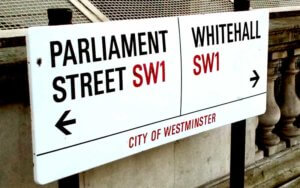 A fund set up to help disabled people with the extra costs they face in gaining elected office will be extended by another year, so that it covers the general election in 2015.
A fund set up to help disabled people with the extra costs they face in gaining elected office will be extended by another year, so that it covers the general election in 2015.
The Government Equalities Office (GEO) also revealed that it had again doubled the upper limit on grants from the fund – which pays for expenses such as taxi fares and British Sign Language interpreters – from £20,000 to £40,000.
The Access to Elected Office for Disabled People Fund, launched in 2012 with an upper limit of £10,000, helps disabled people with the additional impairment-related costs they face in standing for election as a councillor or MP.
David Buxton, the first Deaf BSL-user to be elected as a local councillor, campaigned for 20 years for the fund to be set up, because of his own experiences in being elected as a councillor and standing twice for parliament.
The Liberal Democrat activist had been calling for the grants to be increased for deaf candidates “mainly because of BSL interpreters charging about £250 a day”.
He said: “I am very pleased that they have listened and agreed. This certainly gives deaf people real opportunity to go for standing in the elections.
“We need all political parties, especially local parties, to be fully reassured that this fund will help deaf candidates to do their jobs more effectively without any additional financial burdens to the local parties who heavily rely on volunteers, donations and gifts in kind.”
Since the launch of the £2.6 million fund in 2012 there have been less than 60 applications, with only about a quarter of a million pounds allocated so far to disabled candidates for public office.
A GEO spokeswoman said they had been expecting more disabled people to apply.
She said: “We weren’t expecting there to be thousands of people applying, but the problem we are finding is how do we get these messages out to people and encourage them.”
She said the limit was increased to £40,000 after feedback from BSL-users “and to ensure a level playing field, particularly for the general election, which has a longer campaigning period”.
The fund is also being extended to cover parish and town council elections.
And a change in the law to exempt disability-related costs from the limits on candidates’ spending during English and Welsh local election campaigns will come into effect on 1 June. Previously, such costs were only exempt during parliamentary, Greater London Authority, mayoral, and police and crime commissioner elections.
The Conservative women and equalities minister Helen Grant also announced that a new programme of coaching, mentoring and training would be delivered through the Local Government Association’s Be A Councillor campaign, in partnership with GEO, to encourage more disabled people to be local councillors.
The announcements came as GEO published a series of case studies describing the personal experiences of disabled people in political life.
They include politicians who have faced barriers in communication, transport and mobility, information and attitudes, such as the crossbench peer Baroness [Jane] Campbell, Labour MPs David Blunkett and Dame Anne Begg, the Liberal Democrat peer Baroness Brinton, and Conservative councillor Tom Garrod, who was first elected at the age of 19.
Alice Maynard, chair of the disability charity Scope, said: “Being part of our political life not only creates the space for disabled people to play a key role in these decision-making processes, but can also lead to increased visibility in public life, and ultimately change attitudes towards disability.
“Disabled people are woefully under-represented in public life, and I hope all political parties promote this fund, and individuals take the plunge and use it to its full potential.”
She said the partnership with LGA would “help provide disabled people with the necessary skills and confidence to run for office and play a huge role in challenging attitudes and assumptions around councillor recruitment”.
Grants now range from £250 to £40,000. Applications are open until the end of March 2015.
6 February 2014

 Disabled peers plan to ‘amend, amend, amend, amend, amend’ after assisted dying bill reaches Lords
Disabled peers plan to ‘amend, amend, amend, amend, amend’ after assisted dying bill reaches Lords Two members quit government’s ‘tokenistic’ network because Disability Unit is ignoring disabled people
Two members quit government’s ‘tokenistic’ network because Disability Unit is ignoring disabled people Labour government faces questions over why it stuffed access to elected office committee with Tories
Labour government faces questions over why it stuffed access to elected office committee with Tories